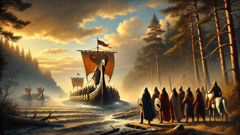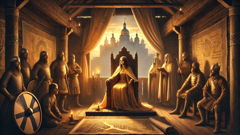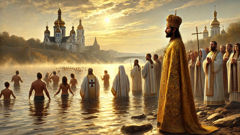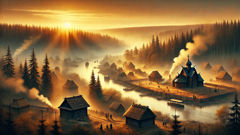Introduction
In the shadowed tapestry of the medieval world, between dense, endless forests and rivers that wound like silver veins through the dark, rich earth, Kievan Rus' took shape. In these lands—where the Dnipro flowed wide and strong and the northern birch groves shivered under the winter moon—tribes once warred and bargained, their destinies bound by blood, oath, and memory. It was a region marked by transition: from pagan rites to the first bells of Christianity, from scattered tribal councils to the rise of princely courts gilded with Byzantine influence. Here, the Eastern Slavs, Finnic peoples, and Norsemen met, mingling languages and customs, forging an identity that would echo through centuries.
Yet, beyond dates and battles, the real history lived in the choices of its people. In the hush of dawn, a woodcutter’s daughter knelt beside the riverbank, whispering to the spirits of her ancestors. In the gilded halls of Kyiv, veiled in incense and candlelight, princes weighed the burden of rule, their ambitions measured not only in conquest but in the fragile hope of unity. And across the great waterways, merchants, warriors, and monks traveled, carrying with them stories and secrets, binding the tapestry ever tighter.
The tale that follows is not a mere recounting of rulers and wars. It is a living chronicle, inspired by the ancient Primary Chronicle, a song of rivers and crowns, faith and ambition. Here, we glimpse the forging of Kievan Rus'—not as a static realm, but as a land alive with dreams and wisdom, where every decision rippled outwards like a stone tossed into deep water. This is a world where destiny is shaped not just by swords, but by the slow, patient work of those who dared to dream of something larger than themselves.
The Arrival of Rurik: Seeds of Unity
Far in the north, where the rivers freeze for months and fir trees cast long shadows, legends told of restless Norsemen—Varangians—who sailed beyond the sea, seeking fortune and dominion. Among them was Rurik, a man whose gaze held both the chill of northern waters and the warmth of hope for something lasting. The Slavic and Finnic tribes, weary from endless feuds and raids, gathered in council under the canopy of ancient oaks. They debated, argued, and lamented the wounds of division, but ultimately sent out an invitation: "Come, rule and judge us."

Rurik, guided by his brothers Sineus and Truvor, answered. Their ships arrived at the shores of Lake Ladoga, white sails fluttering like the wings of mythic swans. With measured patience, Rurik listened to the disputes of chieftains, walked the boundaries of settlements, and set down laws that mingled Norse justice with Slavic tradition. The Varangians were not mere conquerors; they became mediators, settling disputes with fairness unfamiliar yet welcome.
A sense of order began to spread. Fortresses rose at Novgorod and Izborsk, markets flourished, and rivers became arteries of life and trade. Still, suspicion lingered. Some saw Rurik’s rule as foreign imposition, others as the first hope for peace. Yet it was in these uneasy years that the foundations of Kievan Rus' were set, not by force alone, but by the wisdom to bridge difference.
In these formative days, a young boy named Ostromir wandered the bustling wooden streets of Novgorod, watching the Varangians barter furs and honey for bright silks from distant lands. He dreamed of exploring the riverways, of learning the new language of unity that the Norsemen and Slavs spoke in their markets and courts. From his mother, he learned the old songs of the forests; from the newcomers, tales of icy seas and star-marked journeys.
Ostromir’s world changed one autumn evening when his family’s land was disputed by two powerful neighbors. In the presence of Rurik’s steward, the quarrel was settled not by blood, but by negotiation and a binding oath sworn on both a Norse hammer and a Slavic idol. The moment marked a new beginning: a place where compromise and custom merged, forging a unique identity. As Ostromir grew, he would see these small acts of wisdom ripple outward, shaping the land’s future.
Rurik’s death did not end the dream. His son, Igor, inherited a realm fragile yet ambitious, watched over by his steadfast wife, Olga. Their story was just beginning, destined to expand far beyond the northern woods.
Olga of Kyiv: Fire and Wisdom
When Igor fell, betrayed by those he sought to rule, it was Olga who rose from sorrow’s ashes. The young widow became regent for their son Sviatoslav, and her rule was marked not just by vengeance but by a shrewd, enduring wisdom. Legends tell of how she avenged her husband’s death with cunning—inviting her enemies to feasts only to have their fates sealed by fire or blade. Yet behind these tales of wrath was a deeper current: Olga knew that lasting rule required not just fear, but respect and innovation.

She reformed laws, established clear tribute routes, and replaced erratic tribal collections with a system that favored order over chaos. Villages flourished along these new routes, their people shielded from arbitrary raids and extortion. Olga walked the line between old and new: she honored pagan traditions in public but quietly sought something greater.
Her journey to Constantinople marked a turning point—not just for her soul but for her realm. The gold-domed city dazzled with its grandeur, but it was the faith of its people that captivated her heart. Olga returned to Kyiv baptized, bearing a new name and a quiet determination. She became a bridge between worlds: the old gods of the Slavs and the new faith of Christendom.
In the shadows of Kyiv’s burgeoning churches, Olga gathered wise men and scribes. Among them was Ostromir, now a young man, whose curiosity had drawn him from Novgorod to the heart of the realm. He watched as Olga debated with priests and elders, seeking a path that would not break the spirit of her people but transform it.
Children in the city heard her story and dreamed of new beginnings—of a time when Kyiv would rival even Byzantium in beauty and wisdom. Though Sviatoslav would inherit the sword and ride to distant campaigns, it was Olga’s reforms that would endure. She taught the land to value not just strength, but foresight—the ability to see what could be, and to lay its foundation one law, one stone, one prayer at a time.
Volodymyr the Great: Baptism and Transformation
Sviatoslav’s sons fought fiercely for power, their struggles echoing the ancient rivalries of the land. It was Volodymyr who emerged, his rule first marked by tempestuous passions—many wives, many battles, shifting alliances. Yet in time, the prince grew restless with endless war and divided loyalties. He sought something greater to unite the realm, something that could turn scattered tribes into a single people.

Volodymyr sent envoys across distant lands: to the Volga Bulgars, to the Khazars, to Rome, and finally to Constantinople. Each returned with tales of faiths—some stern and ascetic, others radiant and mysterious. It was the splendor of Byzantine worship that captured their hearts: the gilded icons, the chanting that seemed to draw heaven to earth. Volodymyr listened, weighed, and made his decision.
The baptism of Volodymyr in Chersonesus was not just a personal act; it was the pivot on which Kievan Rus' turned. He ordered the idols cast into the Dnipro, called his people to the river’s edge, and watched as thousands waded into the water beneath the watchful eyes of priests and warriors. Resistance flared in some hearts—how could they let go of their ancestors’ gods? But Volodymyr was patient. He built churches, cared for the poor, and brought the wisdom of books and scholars from Byzantium.
Ostromir, now a scholar at court, found his life transformed. He translated holy texts into the Slavic tongue, taught children to read by candlelight, and marveled as new schools blossomed where forests once held only wolves and bandits. The city’s markets rang with laughter and debate; Kyiv became a place where East met West, where merchants brought silks from the east and silver from the north.
Not all was peaceful: old tensions simmered, and Volodymyr’s reforms faced resistance. Yet slowly, a new identity emerged—rooted in both the soil of Rus’ and the faith that promised unity beyond bloodlines. The land of rivers and crowns was becoming a nation in spirit as well as in name.
Conclusion
The centuries turned, and Kievan Rus' grew in renown—its cities bustling with life, its princes hailed in distant lands. The chronicles written by monks and poets would remember the valor of Sviatoslav’s campaigns, the grandeur of Yaroslav the Wise’s laws, the beauty of Kyiv’s golden domes. Yet beneath these triumphs lay the deeper story: a land once divided by fear and longing, now striving—imperfectly but persistently—toward unity and wisdom.
Ostromir, now an elder scribe, watched as new generations learned to read in the shadow of cathedrals he had helped fill with books. He understood that the true measure of a nation was not just in its victories or monuments but in the hearts of its people—their capacity to adapt, to reconcile, to dream beyond the limits of tribe or creed. The rivers that once separated villages now bound them together; the old songs mingled with new prayers, weaving a fabric that could weather storms.
The legacy of Kievan Rus' lived not only in borders or crowns but in its enduring pursuit of wisdom—the patient work of building trust where there had been suspicion, and hope where there had been fear. Through the centuries, even as empires rose and fell, this lesson remained: that greatness is born not just from power or faith, but from the courage to unite what once was scattered. The Primary Chronicle, and all those who lived its stories, remind us that wisdom is a river—sometimes slow, sometimes wild, always carving its path toward a distant sea.













